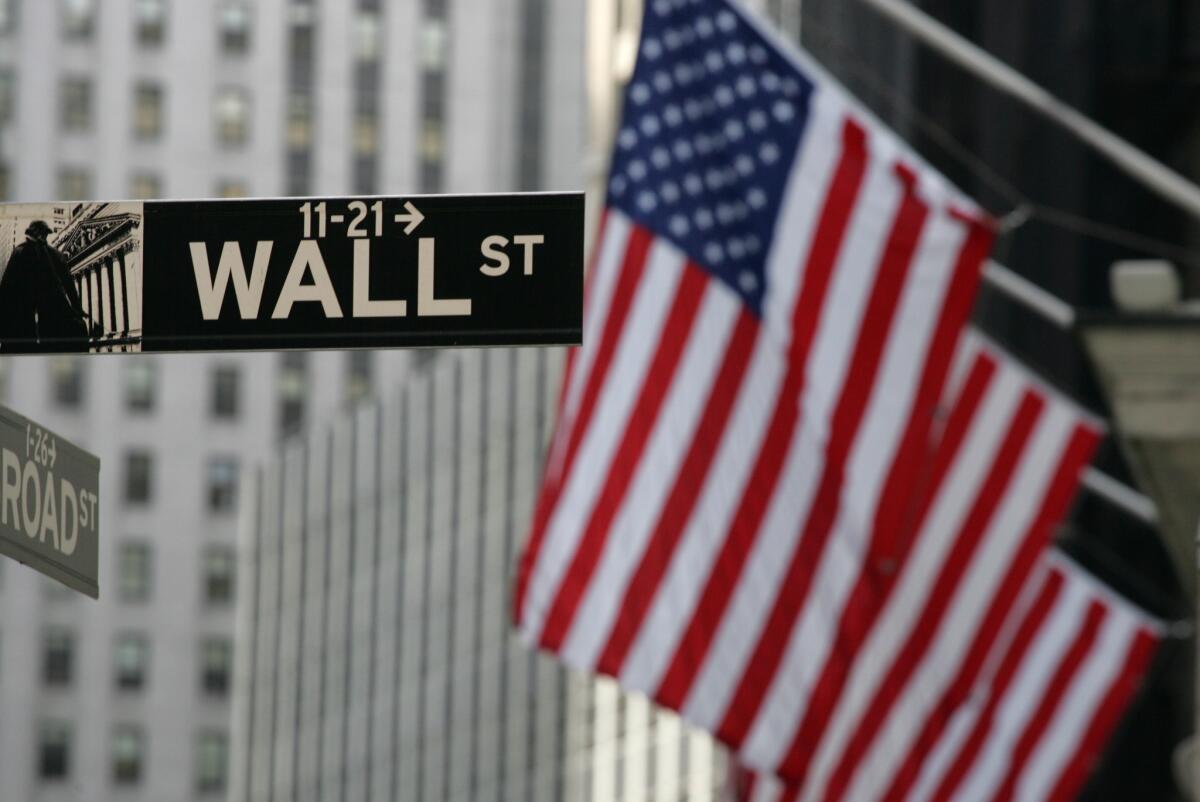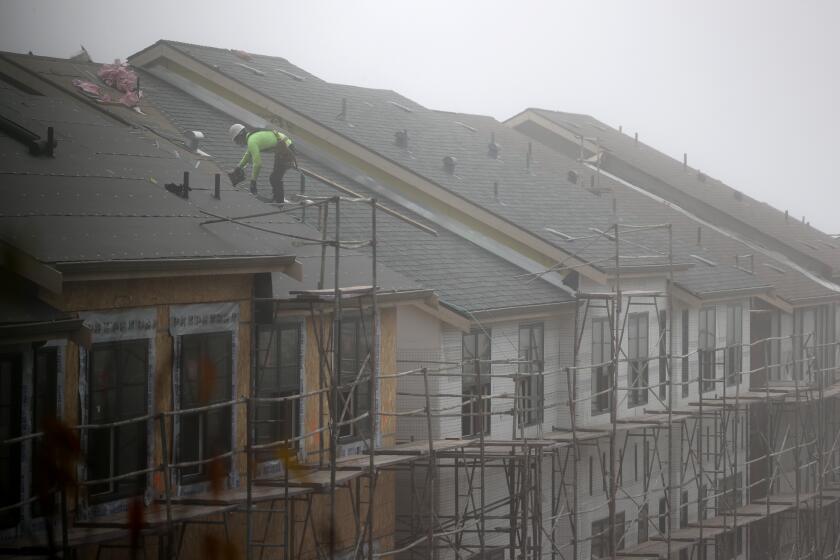Stocks climb again on Wall Street with hopes for stimulus

- Share via
Stocks rose for the second day in a row Thursday, reflecting hope on Wall Street that Washington can approve more aid for the economy and encouragement from a report that suggests the pace of layoffs is slowing a bit, even though it remains incredibly high.
The Standard & Poor’s 500 index climbed 0.8%, adding to its solid gains from a day earlier, when President Trump apparently backtracked on his decision to halt talks on more aid for the economy. He said in a televised interview Thursday morning that “very productive” talks have begun on stimulus.
Stocks have been particularly rocky since early September, swerving on worries about things such as too-expensive prices and the still-raging pandemic, but the S&P 500 has been generally climbing the last two weeks and is on pace for its best week since August.
Resurgent optimism about the possibility that the Democrats and Republicans will deliver another economic aid package has kept investors in a buying mood the last couple of days.
The S&P 500 rose 27.38 points to 3,446.83. The Dow Jones industrial average gained 122.05 points, or 0.4%, to 28,425.51. The Nasdaq composite picked up 56.38 points, or 0.5%, to 11,420.98.
Small company stocks fared better than the rest of the market. The Russell 2000 index of small-cap stocks climbed 17.51 points, or 1.1%, to 1,628.55. Global stock indexes also closed higher.
Many industries have taken a severe hit, but the state’s housing market should enjoy a quick recovery, a UCLA forecast predicts.
Banks and technology and communication companies accounted for much of the broad gains. Energy stocks notched the biggest gain as the price of U.S. crude oil climbed more than 3%. Occidental Petroleum climbed 8.8%, the biggest gainer in the S&P 500.
A government report showed that 840,000 workers applied for unemployment benefits last week. That’s down slightly from 849,000 the previous week, though it’s still remarkably high compared with history. It also was slightly worse than economists were expecting, 837,000.
Still, several areas of the economy have been slowing recently after supplemental weekly unemployment benefits and other stimulus for the economy approved by Congress earlier this year expired. That has investors focused on whether Congress can deliver more aid. So far, bitter partisanship on Capitol Hill has been preventing a deal.
The market has been swooping up and down this week in particular. On Tuesday, Trump said he’d told his representatives to halt stimulus negotiations until after the election because, he said, House Speaker Nancy Pelosi was negotiating in bad faith. That caused stocks to suddenly swing from a 0.7% gain to a 1.4% drop.
But just a few hours later, Trump said he would be open to several targeted programs, including aid for the airline industry specifically and $1,200 in payments to Americans. That caused Wednesday’s rise, with the S&P 500 more than recovering all its losses from Tuesday.
Pelosi spoke with Treasury Secretary Steven T. Mnuchin on Wednesday evening about a stand-alone effort to help the airline industry, and they agreed to talk again Thursday.
On Thursday morning, Trump said in an interview with Fox Business that he shut down talks “because they weren’t working out. Now, they are starting to work out.”
But, Pelosi on Thursday said there wouldn’t be a stand-alone bill for the airline industry unless it was part of a more expansive bill.
Despite the uncertainty about the prospects for another bailout, airline stocks notched gains Thursday. United Airlines rose 1.7%, Delta Air Lines picked up 1.6% and American Airlines added 0.7%.
Some investors see rising poll numbers for Joe Biden in the upcoming presidential election as an indication that more stimulus may be on the way, regardless of what Trump says. If Democrats sweep the White House, Senate and House of Representatives, they say a big rescue package becomes more likely. And that could offset higher taxes and tighter regulations that a Democratic-controlled government could also create.
Merger-and-acquisition activity also helped to boost markets. Eaton Vance jumped 48.1% after Morgan Stanley agreed to buy the investment company. Morgan Stanley rose 0.6%.
IBM rallied 6% after it said it was spinning off a business unit that provides infrastructure services, as it focuses on its cloud and artificial intelligence businesses.
Of course, many risks remain for the market. To critics, stocks still look expensive relative to corporate profits. Tensions between the world’s two largest economies, the United States and China, are still simmering. And on top of it all, the pandemic is still raging, with Trump’s own COVID-19 diagnosis showing how far it is reaching.
Germany is seeing a sharp jump in new coronavirus infections, raising fears the pandemic is gaining in a country that so far has coped better than many of its European neighbors. The British government is mulling over fresh restrictions on everyday life amid mounting evidence that the measures so far have done little to keep a lid on new coronavirus infections. France reported a record number of infections Wednesday.
European markets rose broadly, and Asian markets closed mostly higher. The yield on the 10-year Treasury note fell to 0.76% from 0.81% late Wednesday.
More to Read
Inside the business of entertainment
The Wide Shot brings you news, analysis and insights on everything from streaming wars to production — and what it all means for the future.
You may occasionally receive promotional content from the Los Angeles Times.











